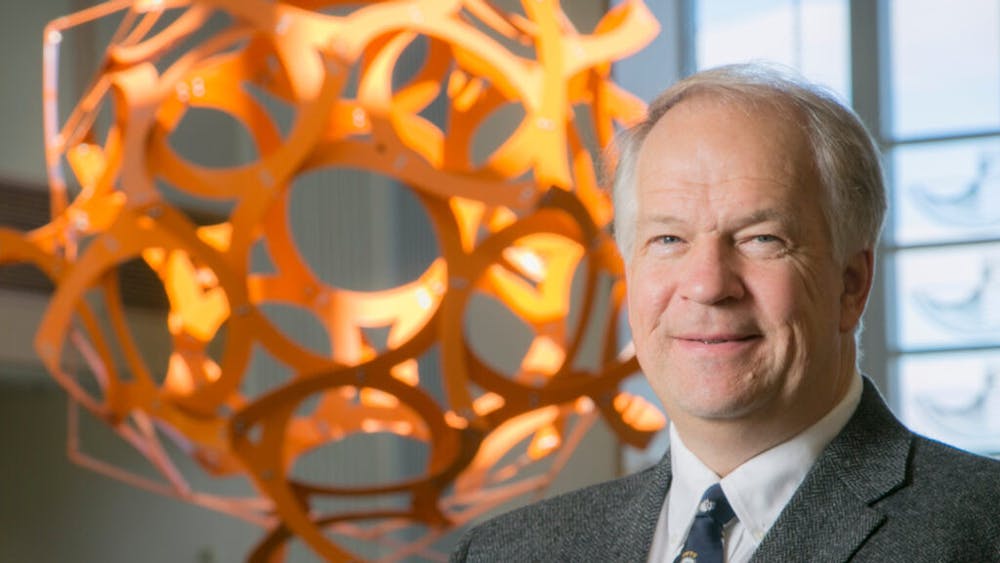Joseph Izatt, chair of the department of biomedical engineering and Michael J. Fitzpatrick professor of engineering, is remembered as an exceptional pioneer in biomedical optical coherence tomography and an inspiring mentor.
Izatt, 61, died on April 7 after suffering a medical emergency while flying a private airplane. The only other passenger on board with Izatt made an emergency landing at the Raleigh-Durham International Airport. The landing had no impact on airport operations.
Izatt was a “lovely, honorable and humble man,” according to Sina Farsiu, Anderson-Rupp professor of biomedical engineering. Farsiu was co-advised by Izatt during his time as a postdoctoral researcher and had been a close colleague and friend of Izatt’s for 17 years.
Izatt first joined the BME department at Duke in 2001. Throughout his 23-year tenure, Izatt received the 2008 Capers and Marion McDonald Award for Excellence and Advising from the Pratt School of Engineering and the 2017 Dean’s Award for Excellence in Mentoring from the Duke Graduate School.
As a skilled researcher and inventor, Izatt pioneered the development of optical coherence tomography, which helps inform diagnosis and treatment decisions for retinal diseases and conditions.
Izatt was always extremely motivated, curious and passionate about the field, according to Farsiu.
“If [he] found a scientific problem he had to solve, or he liked to solve, even if he was originally not at all qualified or educated to do that, he would pursue it over and over and put the time and effort to become the best in that field,” said Farsiu.
Izatt displayed an impressive work ethic and consistent motivation throughout his career. Even during the COVID-19 pandemic, he was known for always being in his office.
“He told me he hated sitting at home. The moment he could come in, he [would come] for eight hours a day because he liked being in his office,” said Ashutosh Chilkoti, Alan L. Kaganov professor of biomedical engineering and acting chair of the department.
Beyond his academic contributions at Duke, Farsiu added that Izatt was known for his humility “despite being one of the most brilliant minds that has ever graced this earth.”
“I never saw him once show irritation [with] anybody. I don't think you'd find anybody to say anything negative about him,” Chilkoti said. “Everybody respected him. When he spoke, people listened because he was just so thoughtful.”
Izatt’s impact spans well beyond Duke.
Through his research, Izatt held more than 75 US patents and was elected to the National Academy of Inventors in 2017. With Cynthia Toth, Joseph A.C. Wadsworth distinguished professor of ophthalmology, he co-founded Bioptigen in 2006 — a medical device company that specializes in high-resolution imaging devices for non-invasive diagnosis of eye diseases and other medical applications.
Today, the OCT imaging systems produced by Bioptigen are used in a wide range of clinical ophthalmology and preclinical research applications in the biomedical field.
Izatt earned a bachelor’s degree in physics, a master’s and a doctorate from the Massachusetts Institute of Technology, finishing his studies in 1991. In the three decades since, he has educated generations of professors and scientists at different universities, people who “are leading the boundaries of science in the fields of imaging and photonics,” according to Farsiu.
“He embodied all that is best not just [about] Duke, but universities,” Chilkoti said. “he was a scholar, he was a mentor. He was a wonderful human being. And I hope that’s how he will be remembered. As a person, as a scholar, as a teacher, as a mentor, as a researcher — he excelled in all of those things.”
Get The Chronicle straight to your inbox
Signup for our weekly newsletter. Cancel at any time.

